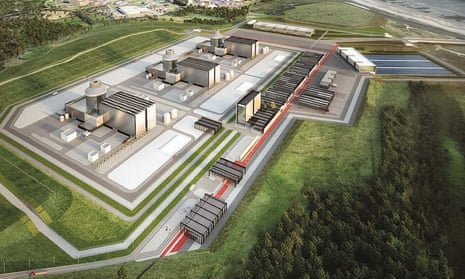Plans for a new nuclear power station in Cumbria are on the verge of collapsing after the Toshiba-owned company behind it laid off 60% of its workforce and embarked on a final effort to sell the project.
Toshiba was due to sell the NuGen consortium to South Korea state-owned firm Kecpo in early 2018, as the Japanese firm exits international nuclear projects and looks to recoup some of the £400m it has spent on the Moorside plant.
However, Kepco has been delaying a final decision, due in part to the UK government signalling a new approach to financing nuclear power stations.
That forced NuGen to cut 60 of 100 jobs on Tuesday, following a six-week consultation with staff.
Unions said the the project’s problems showed the need for the government to take a stake in Moorside.
Justin Bowden, the GMB national secretary, said: “The looming collapse of this vital energy project has been depressingly predictable for months.”
The skeleton NuGen team is now focused on clinching a deal with Kepco by the end of the year before Toshiba writes the unit off entirely at the end of March 2019.
Success will hinge on whether Kepco buys into a new financing approach for nuclear power plants that the government is exploring, known as the regulated asset base (RAB) model.
Officials think it could deliver the government’s nuclear ambitions more cheaply for consumers than alternatives.
Failure would leave a huge hole in ministers’ hopes for as many as six new nuclear plants, as well as costing the north-west thousands of jobs and billions of pounds of investment.
The business secretary, Greg Clark, first said the UK was looking at RAB for new nuclear in June.
That threw a spanner in the works for Kepco, which was planning on a financing model similar to Hinkley Point C, where developer EDF Energy was awarded a guaranteed price for electricity in return for taking on all the construction risk.
The RAB model has mainly been used by water utilities dealing with long-term, capital-intensive projects. The Thames Tideway tunnel – London’s “supersewer” – is one of the most high-profile and contentious recent examples.
The approach involves a regulator – in the case of nuclear power stations most likely to be Ofgem – setting a fixed sum for the costs of the scheme, and a fixed return for the project’s backers. Those returns would be funded by energy bill payers.
France’s EDF Energy, which wants to build a second nuclear power plant at Sizewell in Suffolk, is an enthusiastic backer of the model, which it believes would significantly reduce financing costs and therefore be cheaper for consumers.
It envisages pension funds providing most of the capital for Sizewell C, which could cost in the region of £16bn, encouraged by the certainty provided by using RAB.
The economist Dieter Helm, an influential government adviser, has said that while society must decide whether it wants new nuclear or not, the financing system would be an improvement on the way Hinkley had been financed.
“The market cannot decide. If that decision is to proceed, the RAB model is both plausible and preferable to the Hinkley model,” he wrote.
But the model is likely to be ditched if Jeremy Corbyn comes to power. Labour called the mix of RAB and nuclear power a “spectacularly risky deal for consumers”.
Alan Whitehead, the shadow energy minister, said: “Using customers’ bills to make a bet that construction of such large and complex projects will not overrun in terms of cost or time is a reckless act.”
Industry sources said the recent appointment of Thames Tideway’s former chief financial officer, Mark Corben, at the business department was a “very positive sign” that the government has swung behind the approach.
A team of about 30 government officials is being assembled to work on new nuclear financing, the Guardian understands. The government’s feasibility study on using RAB for new nuclear is expected in January.
